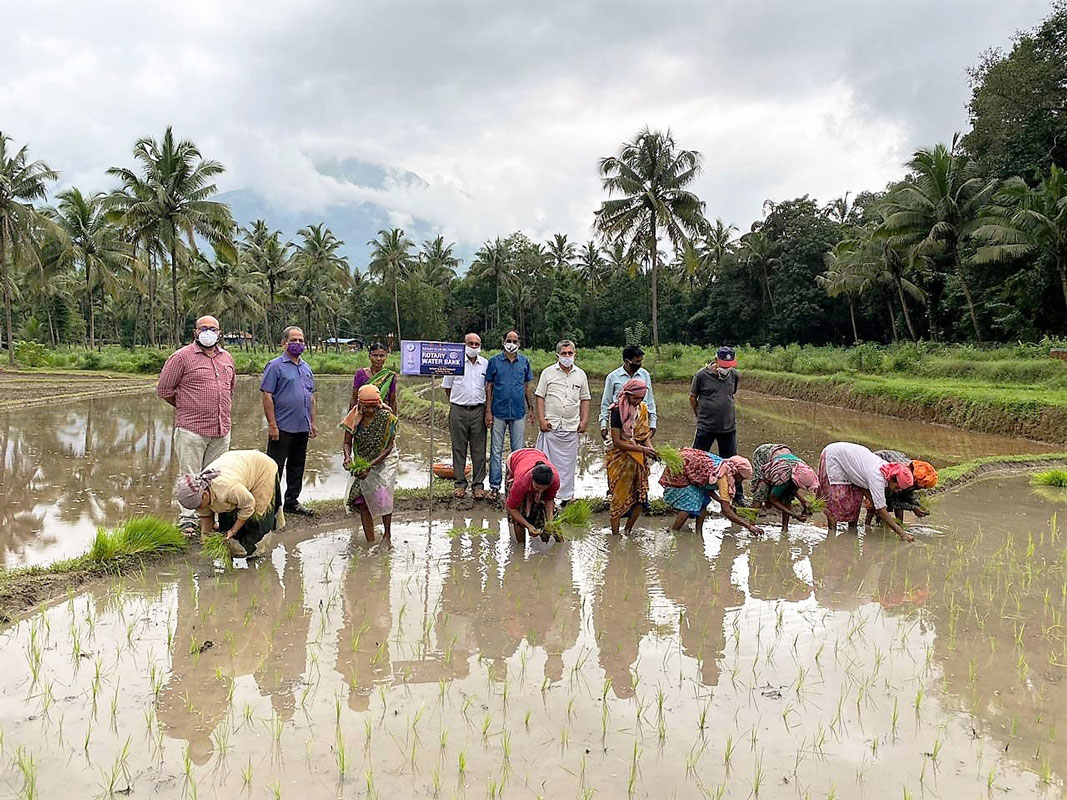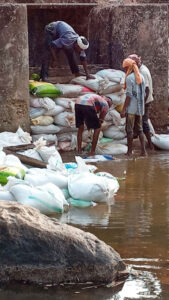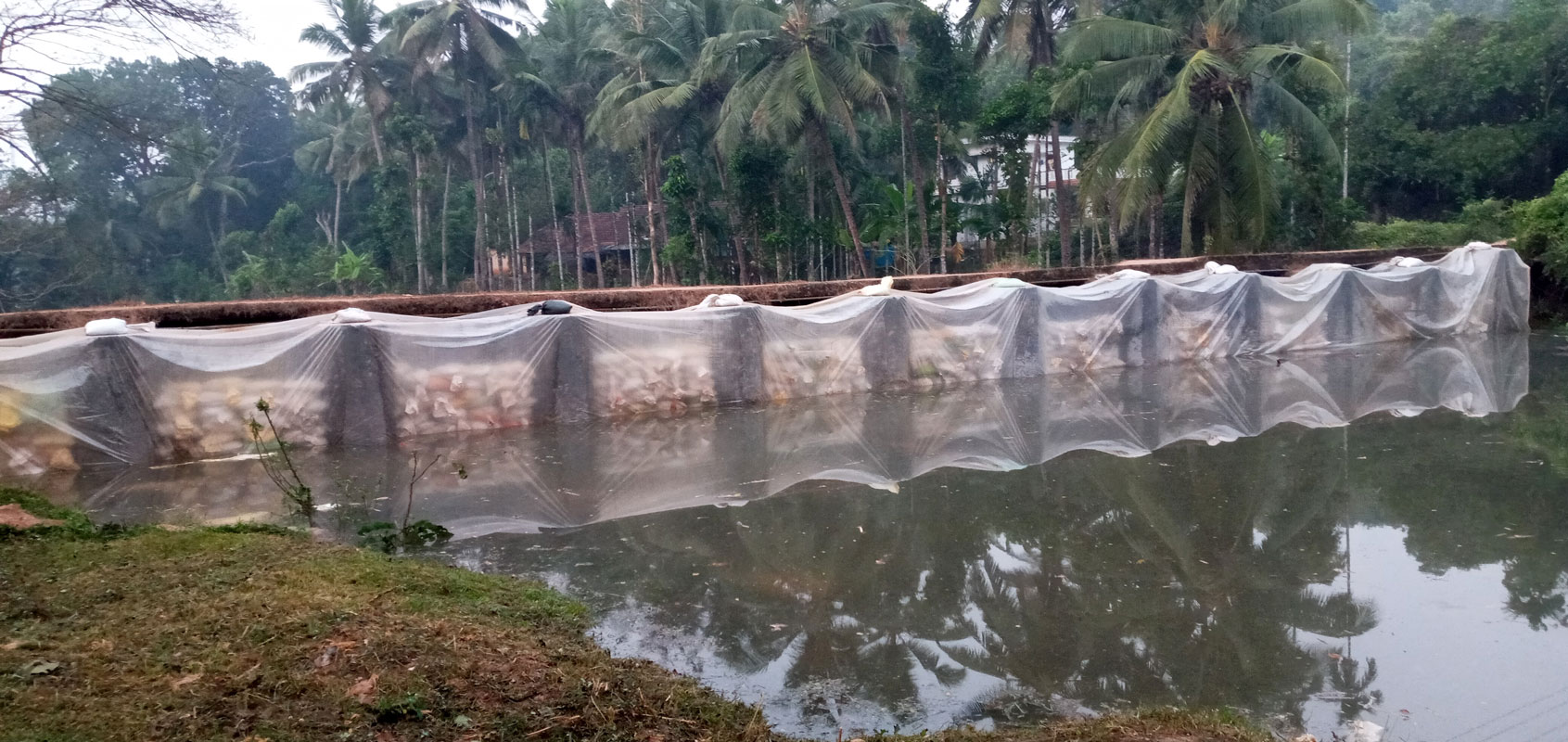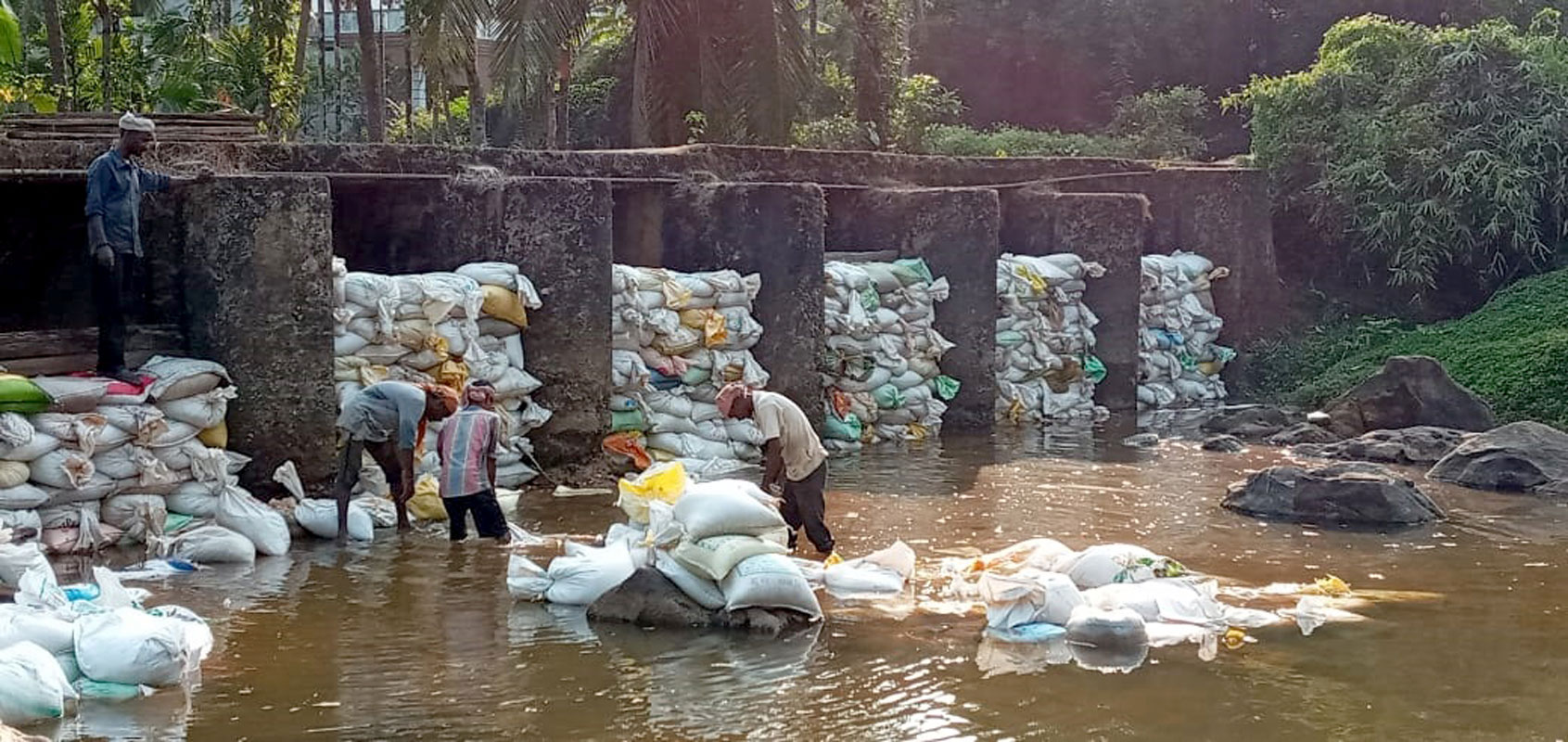Sustainable water conservation projects by RC Belthangady, RID 3181

Keeping in mind the need for sustainable water conservation, RC Belthangady, RID 3181, has carried out a clutch of innovative, replicable and money-saving water conservation projects, thereby admirably serving the latest focus area of Rotary International — conserving the environment.
Let’s begin with the project for farmers to boost paddy cultivation in the taluk. Belthangady is a town in Karnataka, about 60km from Mangalore, and close to the popular pilgrimage spot Dharmasthala. In this taluk, in recent years, paddy fields have vanished due to farmers going in for plantation crops. “In the good old days, a paddy field served as a natural water bank in this region. But due to the disappearance of paddy fields, a few years ago, Belthangady was declared as a brown belt region, and its water table was constantly depleted,” says president of the club Dhananjaya Rao. The club has 80 members, and is the only club in this town.
Due to the disappearance of paddy fields, a few years ago, Belthangady was declared as a brown belt region, and its water table was constantly depleted.
The club members devised a project to encourage farmers to revive paddy cultivation in this region, particularly in land that was lying barren and fallow, by educating the local farmers and giving them necessary support. Explaining the background of the farming practices in this Dakshina Kannada taluk, Rao says that earlier the farmers here grew paddy, and the paddy fields, with standing water, became a natural source of water conservation. “But over the years, as the cost of farm labour went up, along with the cost of processing and converting paddy into rice, most of the farmers gradually moved away to the cultivation of arecanuts, which doesn’t require much water.”
The flip side is that as arecanut doesn’t need much water, and in the rainy season, there is a problem of plenty, the “water actually has to be drained out from these fields. This is the exact opposite of paddy cultivation which is done by flood irrigation, in the sense the water is allowed to stay in the paddy field for five or six months, and because of that natural water conservation happened,” Rao adds.

Most of the farmers here have a small landholding of between two to four acres. The admirable thing is that RC Belthangady members have undertaken this water conservation project in a sustainable manner; it has been ongoing for five years. For the last couple of years, they have been giving farmers modern equipment such as power tiller. The actual cost of such a power tiller, needed for paddy cultivation, is around ₹3 lakh. “But there is government subsidy of ₹1.5 lakh. We, club members, raise the remaining ₹1.5 lakh, and donate the power tiller to the farmers.”
This year, the members are encouraging the farmers to switch over to paddy cultivation, and “we support them by paying the labour cost for tilling or ploughing the land. This cost is around ₹3,000–4,000 per acre, and our club members are happy to raise that money,” Rao smiles.
The result of these Rotarians’ labour is “establishment of natural water banks in 15 acres of land across Belthangady taluk, including in the villages of Laila, Mundaje, Andinje, Mithabagilu, Koyyur and Kuvettu.
“Our research tells us that if one inch of water is stored in one acre of land, this will boost and augment water storage in the subsoil by over one lakh litres per day. By this math, our club has conserved 15,41,580×120 days of water per day in the paddy fields in Belthangady.”
The result of this, adds the club president, is that both the farms and homes in the region have experienced a sustained rise in the water table.
Constructing check dams
Keeping their focus on an environmental-friendly activity like water conservation, this club has also taken up construction of check dams. Rao explains that “earlier, community-level collaborative activities like construction of check dams was a conventional mechanism of farm irrigation and conserving water. But with the evolution of individualised farming, traditional ethos have been threatened.”
More than 50 to 100 acres of agricultural land spread over a radius of 5–10km had water percolating into their tanks and wells.
So, to revive the traditional ethos of cooperative and collaborative community work, RC Belthangady members collaborated with another club in the district — RC Mangalore Downtown — and others from the larger Rotary family such as the RCC, Rotaract Club, NSS units of Government First Grade College, Belthangady and SDM Polytechnic College, Ujire, as well as the local community. The result of this vibrant partnership is the construction of six check dams across the natural water streams flowing in Belthangady. “Apart from the local community, we also used the services of members of our three Rotaract and five Interact clubs, and five RCCs. So you see, we have a small army from the Rotary family to help us with our water conservation efforts!”
Locally available environmental-friendly materials like sand, mud, branches of coconut trees, stones and wooden planks were used to build the sides. “We also used tarpaulin and polythene bags to ensure the water holds.”

When I frown on the use of polythene bags, Rao explains that most of the time cement bags are used to fill the sand and other materials to bolster the walls of the check dams. But as cement bags are not leakage-proof, the polythene bags are used to prevent seepage of water away from the sides.
For the construction of each such dam, which took around two to three days, the Rotarians used “nearly100 members” to provide the labour. “Our role was to ensure that fresh, home-cooked meals were served to each one of them.”
The dams were constructed in the village areas taking into consideration the catchment area of each dam and the number of beneficiaries, and the villages of Mundaje, Thotathady, Neria, Charmady and Laila benefited. “Over 150 families benefited from the project and more than 50 to 100 acres of agricultural land spread over a radius of 5–10km had water percolating into their tanks and wells. The usage of locally available products and minimum cost were the highlights of the project,” says Yogish Bhide, club service director.
 A fallout of this sustainable water conservation endeavour of RCB “has attracted attention from the media, researchers, social workers and the larger community. Now we render consultancy services for adopting water conservation techniques by involving local communities,” Rao says with satisfaction.
A fallout of this sustainable water conservation endeavour of RCB “has attracted attention from the media, researchers, social workers and the larger community. Now we render consultancy services for adopting water conservation techniques by involving local communities,” Rao says with satisfaction.
Stopping water wastage
Even as scorching summer days are on, it is a common sight to see colossal waste of water due to overflowing of the overhead tanks in homes, schools and offices. K P Prasad, a Rotarian and alumni of NITK, Surathkal, who heads the SDM Polytechnic College, under the guidance of Rtn D Veerendra Heggade, a philanthropist and hereditary administrator of the Dharmasthala Temple, has invented and popularised an affordable device to reduce such wastage. This he has done through a device that he has named SDM Rotary Jala Rakshak.

This device monitors the water level in the overhead tank as it is being filled, and an alarm goes off when the water reaches a certain level in the tank. RCB distributed 50 such water saving devices to public offices such as gram panchayat, police stations, schools etc.
Filtering rainwater
Another project titled Rotary Jeevadhara is associated with filtering the rainwater before storing it so that silt and other organic residues in the water are removed, and the quality of the water improves. For this purpose, the club members designed a rainwater harvest filter at an affordable cost of ₹3,500 and distributed 10 filters to factories, offices and houses in order to encourage better quality rainwater harvesting. Through this simple device water can be filtered and flown directly to open or tube wells.
Heartbreaking
Sometimes when Rotarians put in so much of planning, effort and funds into a community service project, it is heartbreaking to see the project “demolished”, within a few months of its evolution. In Feb 2021, members of RC Belthangady, in partnership with RC Mangalore Downtown, started work on a vented dam in a place called Bajakkiresal in Laila village, in Dakshina Kannada district.
Giving details of the project, club service director Yogish Bhide says 11 vents were put up in this dam, and the work was completed in four days. “About 120 NSS students from the Government College, Belthangady, helped us to fill 700 bags of sand, plastic sheets measuring 110ftx14ft were given by Suresh Hebbar, a member of RC Mangalore Downtown, and 60 bags were used for each vent. Only eight paid labourers were used and we served home-cooked food to all those who worked here, with some people also giving a sweet dish!”
The result of this work was that the water level rose to a height of 4ft, across 4km along the river; “40 acres land were irrigated directly and about 200 local people benefited by getting the water levels in their wells rising consistently. I also live close by and personally benefited from it.”
He added that DG Ranganath Bhat inaugurated this Rotary vented dam.
But the heartbreaking part comes now. Says Bhide, “Sadly, very recently this vented dam was demolished by the administration for construction of a new road to connect two villages.” Till May 1, there was substantial water in the dam, thanks to this conservation project. Incidentally, Bhide himself comes from an agricultural family.
So this must be heartbreaking for the Rotarians, I ask him. His reply forms the crux of the positive thinking that Rotary inculcates. “Yes it is, I can’t deny that. Actually, this dam was not listed in any government records and to construct the dam my grandfather had taken the initiative some five decades ago. But for many years it was lying unused. And now, we are also happy that the new dam will be constructed along with the bridge which was the only route possible to connect certain areas of the village. This was necessary too for general development,” he smiles.


